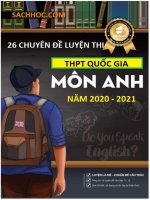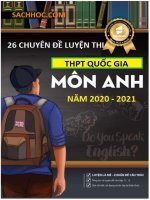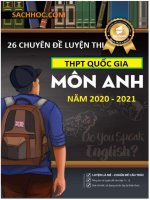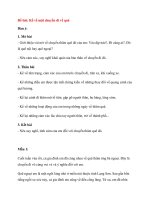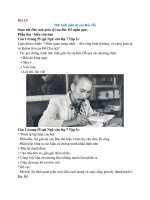de luyen thi thpt quoc gia mon tieng anh nam 2021 so 18
Bạn đang xem bản rút gọn của tài liệu. Xem và tải ngay bản đầy đủ của tài liệu tại đây (305.87 KB, 9 trang )
Thư viện Đề thi - Trắc nghiệm - Tài liệu học tập Miễn phí
ĐỀ THI THỬ THPTQG MƠN TIẾNG ANH
NĂM 2021 CÓ ĐÁP ÁN
Mark the letter A, B, C, or D on your answer sheet to indicate the word whose underlined
part differs from the other three in pronunciation in each of the following questions.
Question 1: A. recruits
B. affords
Question 2: A. interview B. certificate
C. happens
D. survives
C. begin
D. bride
Mark the letter A, B, C, or D on your answer sheet to indicate the word that differs from the
other three in the position of primary stress in each of the following questions.
Question 3: A. believe
B. borrow
C. design
D. expect
Question 4: A. capital
B. national
C. vacation
D. chocolate
Mark the letter A, B, C, or D on your answer sheet to indicate the correct answer to each of
the following questions.
Question 5: If there ______ some restaurants near the hotel, the tourists would not have to take
taxis.
A. were
B. have been
C. will be
D. would be
Question 6: When Linda ______ last night, I ______ my favourite show on TV.
A. was calling - watched
B. called - have watched
C. called - was watching
D. had called - watched
Question 7: The thief didn't admit ______ the money.
A. to steal
B. being stolen
C. stealing
D. to be stolen
Question 8: Your mother can speak English and Chinese very well, ______?
A. didn’t she
B. won’t she
C. can’t she
D. doesn’t she
Question 9: We don't have a house at the moment, but I'm sure something better will ______.
A. go up
B. turn up
C. stay up
D. give up
Question 10: I like the tale of Kieu ______ by Nguyen Du.
A. wrote
B. having written
C. writing
D. written
Question 11: We visited Japan, Canada and ________ United States.
Trang chủ: ht t p s : / / v n d o c . c o m / | Email hỗ trợ: | Hotline: 02 4 22 4 2 61 8 8
Thư viện Đề thi - Trắc nghiệm - Tài liệu học tập Miễn phí
A. a
B. an
C. the
D. Ø (no article)
Question 12: They were sacked ______ their carelessness.
A. because
B. because of
C. although
D. despite
Question 13: Life in the countryside is very ______, isn’t it?
A. peace
B. peaceful
C. peacefully
D. peacefulness
Question 14: I have great ______ for the young teachers who devote their life to teaching
children in remote and mountainous areas.
A. admiration
B. intention
C. sympathy
D. consideration
Question 15: Great apes are in ______ of becoming extinct.
A. crisis
B. threat
C. danger
D. warning
Question 16: The students were worried that they wouldn't be able to ______ the deadline for the
assignment.
A. beat
B. answer
C. meet
D. match
Question 17: They divided the money up ______ their three children.
A. at
B. on
C. among
D. without
Question 18: They were mocking him ______.
A. because he kept falling off his bike
B. after he has kept falling off his bike
C. as soon as he was keeping falling off his bike
D. before he had kept falling off his bike
Question 19: It was only after they got married that he showed himself in his true ______ .
A. aspects
B. features
C. colours
D. faces
Mark the letter A, B, C, or D on your answer sheet to indicate the word(s) CLOSEST in
meaning to the underlined word(s) in each of the following questions.
Question 20: Today’s scientists have overcome many of the challenges of the depth by using
more sophisticated tools.
A. complicated
B. worldly
C. experienced
D. alert
Question 21: A modern extension on the old building would ruin its architectural integrity.
A. produce
B. spoil
C. install
D. contain
Mark the letter A, B, C, or D on your answer sheet to indicate the word(s) OPPOSITE in
Trang chủ: ht t p s : / / v n d o c . c o m / | Email hỗ trợ: | Hotline: 02 4 22 4 2 61 8 8
Thư viện Đề thi - Trắc nghiệm - Tài liệu học tập Miễn phí
meaning to the underlined word(s) in each of the following questions.
Question 22: His career in the illicit drug trade ended with the police raids this morning.
A. elicited
B. irregular
C. secret
D. legal
Question 23: I don’t know what they are going to ask in the job interview. I’ll just play it by ear.
A. plan well in advance
C. listen to others saying
B. be careful about it
D. do not plan beforehand
Mark the letter A, B, C, or D on your answer sheet to indicate the option that best completes
each of the following exchanges.
Question 24: Mr. Edwin is talking to a hotel clerk at Home Again Hotel.
- Hotel clerk: “Welcome to the Home Again Hotel, sir. How may I help you?”
- Mr. Edwin: “______”
A. No, thanks. I had a reservation.
B. I would like a non-smoking room with a double bed.
C. Yes, I want to look for a room.
D. Sorry. I don’t want to stay there.
Question 25: A customer is talking to a shop assistant about the sweater he has chosen.
- Customer: “That's nice. Could I try it on?” - Shop assistant: “______”
A. Certainly, the changing rooms are over there.
B. Oh, sorry. We don’t have this room.
C. That’s right. You should try it before buying.D. Yes, of course, but you must pay the bill first.
Read the following passage and mark the letter A, B, C, or D on your answer sheet to indicate
the correct word or phrase that best fits each of the numbered blanks from 26 to 30.
Brave William Baldock, who is six years old, is a hero after helping his mother (26)
______ she fell downstairs. William quickly rang for an ambulance when he discovered his
mother had broken her leg. In spite of being frightened, he told the emergency services what
had (27) ______ and answered all the questions they asked him. He also telephoned his father at
work, and then his grandmother, to explain what he had done. While waiting for these people to
come, William looked after his 18-month-old sister. When ambulance man Steve Lyn went to
the house, he was amazed: 'It's great that a young boy of six knew the right number to dial and
Trang chủ: ht t p s : / / v n d o c . c o m / | Email hỗ trợ: | Hotline: 02 4 22 4 2 61 8 8
Thư viện Đề thi - Trắc nghiệm - Tài liệu học tập Miễn phí
was able to give us the correct information. (28) ______ of William's quick thinking, we were
able to (29) ______ there immediately." Mrs. Baldock left hospital yesterday, very (30) ______
to both William and the ambulance service.
Question 26: A. whom
B. where
C. that
D. when
Question 27: A. happened B. made
C. acted
D. worked
Question 28: A. Therefore B. Because
C. Despite
D. Instead of
Question 29: A. manage
C. get
D. search
C. grateful
D. approving
B. find
Question 30: A. agreeable B. happy
Read the following passage and mark the letter A, B, C, or D on your answer sheet to indicate
the correct answer to each of the questions from 31 to 35.
It is not surprising that the birthplace of cola was the hot and humid American South. This
region had long specialized in creating delicious soft drinks. A druggist in Atlanta, Georgia
named John Pemberton created the most well–known drink brand in the world in the 1880s.
However, it seems clear that he had no idea how big it would become.
Like many American pharmacists of the day, Pemberton was opposed to the drinking of
alcohol and wanted to produce a stimulating soft drink. First, he made “the French Wine of
Coca,” made from the coca leaf. Then he began to experiment with the cola nut. Eventually, he
managed to make a combination of the two that he thought was sweet, but not too sweet.
Deciding that “the two C’s would look well in advertising,” he named it Coca–Cola.
Pemberton’s invention caught on fairly quickly. By 1905, “Coke” was being advertised
all over the country as “The Great Natural Temperance Drink.” The drink enjoyed additional
success since there was a large and popular temperance movement in the US at that time. In the
1920s, alcohol was outlawed, and sales of Coke rose significantly. However, they continued
to rise even after the law was repeated.
Another reason for Coke’s popularity was good business sense. A year after he invented it,
Pemberton had sold Coca–Cola to Asa Griggs Candler for only $283.26! Candler was a
marketing genius, and by the time he sold the Coca–Cola Company in1919, it was worth $25
million.
Trang chủ: ht t p s : / / v n d o c . c o m / | Email hỗ trợ: | Hotline: 02 4 22 4 2 61 8 8
Thư viện Đề thi - Trắc nghiệm - Tài liệu học tập Miễn phí
Question 31: Which could be the best title of the passage?
A. The Invention and History of Coca–Cola
B. Cola is the World’s Most Popular Soft Drink
C. The Temperance Movement and Coke’s success
D. John Pemberton created Coca–Cola.
Question 32: Which of the following is NOT true about Pemberton as stated in the passage?
A. He made “French wine of Coca” from the coca leaf
B. He combined the coca leaf and cola nut to make “French wine”
C. He produced stimulating alcohol from coca leaves and cola nuts
D. He made “French wine of Coca” from the cola nut
Question 33: The word “soft drink” in paragraph 2 refers to ______.
A. alcohol-free drink
B. beer
C. mineral water D. wine
Question 34: According to the passage, Coke’s additional success resulted from ______.
A. The temperance movement
B. Its attracting name
C. Pemberton’s good business sense
D. Coca–Cola’s great taste
Question 35: The word “outlawed” in paragraph 3 mostly means ______.
A. made legal
B. taken to court
C. made illegal
D. allowed
Read the following passage and mark the letter A, B, C, or D on your answer sheet to indicate
the correct answer to each of the questions from 36 to 42.
The difference between the nuclear family and the extended family is that a nuclear family
refers to a single basic family unit of parents and their children, whereas the extended family
refers to their relatives such as grandparents, in-laws, aunts and uncles, etc. In many cultures,
and particularly indigenous societies, the latter is the most common basic form of social
organization.
A nuclear family is limited, according to Kristy Jackson of Colorado State University, to
one or two parents and their own child, or children, living together in a single house or other
dwellings. In anthropology, they only must be related in this fashion; there is no upper or lower
limit on the number of children in a nuclear family.
Trang chủ: ht t p s : / / v n d o c . c o m / | Email hỗ trợ: | Hotline: 02 4 22 4 2 61 8 8
Thư viện Đề thi - Trắc nghiệm - Tài liệu học tập Miễn phí
The extended family is a much more nebulous term, but in essence refers to kin or
relations not covered by the above definition. In historical Europe and Asia as well as in Middle
Eastern, African, and South American Aboriginal cultures, extended family groups were
typically the most basic unit of social organization. The term can differ in specific cultural
settings, but generally includes people related in age or by lineage. Anthropologically, the term
“extended family” refers to such a group living together in a household, often with three
generations living together (grandparents, parents, and children) and headed in patriarchal
societies by the eldest man or by some other chosen leadership figure. However, in common
parlance, the term “extended family” is often used by people simply to refer to their cousins,
aunts, uncles, and so on, even though they are not living together in a single group.
Historically, most people in the world have lived in extended family groupings rather than
in nuclear families. This was even true in Europe and in the early United States, where multiple
generations often lived together for economic reasons. During the 20th century, average income
rose high enough that living apart as nuclear families became a viable option for the vast
majority of the American population. In contrast, many indigenous societies and residents of
developing countries continue to have multiple generations living in the same household. The
rise of the nuclear family in the modern West does not necessarily mean that family
arrangements have stabilized, either. The rapid growth in single-parent households, for instance,
also represents a substantial change in the traditional nuclear family. More couples are also
choosing not to have children at all.
Question 36: What is the passage mainly about?
A. The dominance of nuclear families over extended ones
B. The dominance of extended families over nuclear ones
C. A distinction between nuclear families and extended ones
D. The changes of family types over times
Question 37: The word “the latter” in paragraph 1 refers to ______.
A. family unit
B. relatives
C. the nuclear family
D. the extended family
Trang chủ: ht t p s : / / v n d o c . c o m / | Email hỗ trợ: | Hotline: 02 4 22 4 2 61 8 8
Thư viện Đề thi - Trắc nghiệm - Tài liệu học tập Miễn phí
Question 38: According to the passage, what can we understand about single-parent
households?
A. They are not defined by anthropologists.
B. They are the existing trend of family arrangement.
C. They are included in the term “nuclear family”.
D. They are on the decrease.
Question 39: According to paragraph 3, where were extended families not the most basic unit
of social organization?
A. The Middle East
B. Asia
C. North America
D. Europe
Question 40: The word “patriarchal” in paragraph 3 is closest in meaning to ______.
A. ruled or controlled by men
C. simple with no rules and laws
B. equal for both men and women
D. modern with advanced facilities
Question 41: The word “viable” in paragraph 4 is closest in meaning to ______.
A. impossible
B. possible
C. explainable
D. fashionable
Question 42: Which statement is TRUE according to the passage?
A. Since the 20th century, more and more American couples have lived in extended families
because of the financial burdens.
B. Nuclear families are the most basic form of social organization all over the world.
C. The popularity of nuclear families in western countries helps to stabilize family
arrangement.
D. Traditional nuclear families have changed a lot over times.
Mark the letter A, B, C, or D on your answer sheet to indicate the underlined part that needs
correction in each of the following questions.
Question 43: Each of the beautiful cars in the shop have been quickly sold to their owner.
A. the
B. in
C. have
D. their owner
Question 44: My father wants me to call him every day, tell him my activities, and sharing
what I have learnt.
A. wants
B. tell
C. sharing
D. learnt
Trang chủ: ht t p s : / / v n d o c . c o m / | Email hỗ trợ: | Hotline: 02 4 22 4 2 61 8 8
Thư viện Đề thi - Trắc nghiệm - Tài liệu học tập Miễn phí
Question 45: The UN declaration sought to establish the principal that everyone is entitled to
the same basic rights.
A. to establish
B. principal
C. is entitled to
D. basic rights
Mark the letter A, B, C, or D on your answer sheet to indicate the sentence that is closest in
meaning to each of the following questions.
Question 46: A supermarket is more convenient than a shopping centre.
A. A shopping centre is not as convenient as a supermarket.
B. A shopping centre is more convenient than a supermarket.
C. A supermarket is not as convenient as a shopping centre.
D. A supermarket is as inconvenient as a shopping centre.
Question 47: “I got many good marks last semester,” Trung said.
A. Trung said that I had got many good marks last semester.
B. Trung said that I got many good marks the previous semester.
C. Trung said that he had got many good marks the previous semester.
D. Trung said that he would get many good marks last semester.
Question 48: It will be a mistake of Tony to buy that house now.
A. Tony couldn’t buy that house now.
B. Tony can’t buy that house now.
C. Tony needn’t buy that house now.
D. Tony shouldn’t buy that house now.
Mark the letter A, B, C, or D on your answer sheet to indicate the sentence that best combines
each pair of sentences in the following questions.
Question 49: You can do what you want. Make sure you take good care of the baby.
A. You can’t do what you unless you fail to take good care of the baby.
B. You can do what you want provided you take good care of the baby.
C. You can do what you want if you don’t take good care of the baby.
D. You can’t do what you want in case you take good care of the baby.
Question 50: The plane had taken off. Paul realized he was on the wrong flight.
A. Hardly had Paul realized he was on the wrong flight when the plane took off.
Trang chủ: ht t p s : / / v n d o c . c o m / | Email hỗ trợ: | Hotline: 02 4 22 4 2 61 8 8
Thư viện Đề thi - Trắc nghiệm - Tài liệu học tập Miễn phí
B. It was not until the plane had taken off, did Paul realize he was on the wrong flight.
C. No sooner had the plane taken off than Paul had realized he was on the wrong flight.
D. Not until the plane had taken off did Paul realize he was on the wrong flight.
ĐÁP ÁN
1-A
2-D
3-B
4-C
5-A
6-C
7-C
8-C
9-B
10-D
11-C
12-B
13-B
14-A
15-C
16-C
17-C
18-A
19-C
20-A
21-B
22-D
23-A
24-B
25-A
26-D
27-A
28-B
29-C
30-C
31-A
32-C
33-A
34-A
35-C
36-C
37-D
38-C
39-C
40-A
41-B
42-D
43-C
44-C
45-B
46-A
47-C
48-D
49-B
50-D
Mời các bạn tham khảo các bài tiếp theo tại: />
Trang chủ: ht t p s : / / v n d o c . c o m / | Email hỗ trợ: | Hotline: 02 4 22 4 2 61 8 8



